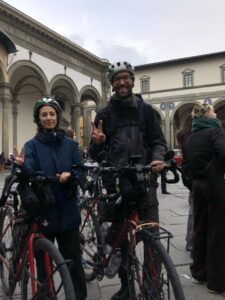by Higerta Gjergji
Sanna Ghotbi and Benjamin Ladraa, activists from Solidarity Rising, have decided to bike 48,000 kilometres through 40 countries, starting from Sweden, all the way to Western Sahara. Their mission is to raise global awareness about Africa’s last colony and mobilize public opinion for the immediate implementation of a free and fair referendum in Western Sahara.

The two activists decided to embark on a biking journey because they felt the need to raise awareness as widely as possible and reach as many people as they could. Their journey began in Sweden in 2022. They cycled across Europe until reaching Turkey, where COVID-19 restrictions forced them to take a flight to South Korea. They continued to Japan and finally arrived in Indonesia. Later, they returned to Europe, reaching Italy at the end of January 2024. Their goal is to continue through Switzerland, France, Spain, Portugal, and ultimately Algeria. Along the way, they stop at universities and other locations to educate or inform local communities. As they pass through, they draw attention because they carry the flag of Western Sahara.
Their bike journey will conclude in the southeastern part of Algeria, where the Sahrawi refugee camps are located. Nearly 200,000 people have lived in these camps since 1975. Initially, the camps consisted of tents in the middle of the desert, but over the past 50 years, they have gradually built houses and schools. In the early years, women took charge of constructing the buildings, as the men were engaged in the war against Morocco. The Government of the Sahrawi Republic is situated within these camps.
Western Sahara is 80% occupied territory, controlled by Moroccan armed forces. The remaining portion is liberated territory, governed by the Sahrawi Arab Democratic Republic. It is from this liberated side that militants of the Sahrawi independence movement, Polisario, waged a heavily armed guerrilla war from 1975 until a ceasefire in 1991. The ceasefire came after the Moroccan king promised the Sahrawi people a referendum. However, to this day, the Sahrawis are still waiting for their chance to cast their votes. They reside in refugee camps in the Algerian desert, in exile, and within the occupied territories.
Morocco has maintained its occupation since 1975, subjecting the indigenous Sahrawi population to daily arbitrary arrests, torture, disappearances, and discrimination. Journalists and human rights organizations are barred from entering the occupied territories, and Morocco employs various tactics to suppress anyone who dares to expose their colonization.
The country is divided by a 2,700-kilometer wall, surrounded by a minefield. Benjamin, in his quest to bear witness, personally travelled from Morocco to Western Sahara. At military checkpoints, he was stopped ten times, questioned about his purpose, and escorted by soldiers once inside the territory.
In the occupied territories, the Sahrawi population faces injustices that do not easily reach beyond the territory, and they cannot turn to a court of justice or hospitals to uphold their basic human rights. This is what drives the two activists on their arduous journey: to bear witness to the injustices and show solidarity with people worldwide by carrying the flag of Western Sahara.
On the cover photo, YouTube screenshot from Solidarity Rising campaign
























